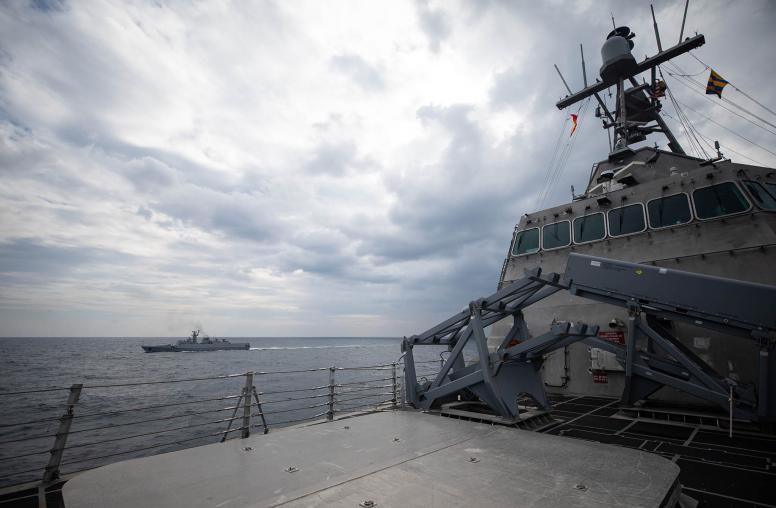The Role of Faith in Promoting Peace in the Middle East
A Special Workshop Sponsored by the Faith & Politics Institute and the United States Institute of Peace
On April 1 the United States Institute of Peace and the Faith & Politics Institute cosponsored a special workshop on Capitol Hill to engage participants in an exploration of the potential role for faith, and the faithful, in promoting peace in the Middle East.
Can faith play a positive role in managing virulent international conflicts and building and promoting peace around the globe? Nowhere is this conflict more evident than in the Middle East. Religious differences often drive misunderstanding and even hatred, yet among the tumult, there is a faithful contingent striving to delegitimize violence in the Middle East.
On April 1 the United States Institute of Peace and the Faith & Politics Institute cosponsored a special workshop on Capitol Hill to engage participants in an exploration of the potential role for faith, and the faithful, in promoting peace in the Middle East. Co-moderated by David Smock, director of the Religion and Peacemaking Initiative at the U.S. Institute of Peace, and Rev. W. Douglas Tanner, Jr., president of the Faith & Politics Institute, the workshop featured:
- Canon Andrew White
Representative of the Archbishop of Canterbury to the Middle East
Over the past few years, Canon White has acted as the negotiator in many conflict situations including the siege of the Church of the Nativity in Bethlehem and the riots between Muslims and Christians in Northern Nigeria. His particular interest is in the Middle East, where he chairs the religious track of the Middle East peace process. He is also very involved in Iraq, being a regular visitor to Baghdad, where he has worked with both the political and religious leadership. - Yehezkel Landau
International Relations Director, Open House, Israel
Mr. Landau's work has been primarily in the field of interfaith education and Jewish-Arab peacemaking. He lectures internationally on Jewish-Christian-Muslim relations and has authored numerous journal articles and is co-editor of the book Voices from Jerusalem: Jews and Christians Reflect on the Holly Land. For the 2002-2003 academic year, he is a faculty associate in interfaith relations at Hartford Seminary. - Mohammed Abu-Nimer
Assistant Professor of International Peace and Conflict Resolution, American University
Professor Abu-Nimer is an expert on conflict resolution and dialogue for peace. As a practitioner, he has been intervening and conducting conflict resolution training workshops in Palestine, Israel, Egypt, Turkey, Ireland, the Philippines, Sri Lanka, Sierra Leone, and the United States. His most recent book is entitled Peace Building and Nonviolence in the Islamic Context: Theory and Practice.
Can faith play a positive role in managing virulent international conflicts and building and promoting peace around the globe? Nowhere is this conflict more evident than in the Middle East. Religious differences often drive misunderstanding and even hatred, yet among the tumult, there is a faithful contingent striving to delegitimize violence in the Middle East.
On April 1 the United States Institute of Peace and the Faith & Politics Institute cosponsored a special workshop on Capitol Hill to engage participants in an exploration of the potential role for faith, and the faithful, in promoting peace in the Middle East. Co-moderated by David Smock, director of the Religion and Peacemaking Initiative at the U.S. Institute of Peace, and Rev. W. Douglas Tanner, Jr., president of the Faith & Politics Institute, the workshop featured:
- Canon Andrew White
Representative of the Archbishop of Canterbury to the Middle East
Over the past few years, Canon White has acted as the negotiator in many conflict situations including the siege of the Church of the Nativity in Bethlehem and the riots between Muslims and Christians in Northern Nigeria. His particular interest is in the Middle East, where he chairs the religious track of the Middle East peace process. He is also very involved in Iraq, being a regular visitor to Baghdad, where he has worked with both the political and religious leadership. - Yehezkel Landau
International Relations Director, Open House, Israel
Mr. Landau's work has been primarily in the field of interfaith education and Jewish-Arab peacemaking. He lectures internationally on Jewish-Christian-Muslim relations and has authored numerous journal articles and is co-editor of the book Voices from Jerusalem: Jews and Christians Reflect on the Holly Land. For the 2002-2003 academic year, he is a faculty associate in interfaith relations at Hartford Seminary. - Mohammed Abu-Nimer
Assistant Professor of International Peace and Conflict Resolution, American University
Professor Abu-Nimer is an expert on conflict resolution and dialogue for peace. As a practitioner, he has been intervening and conducting conflict resolution training workshops in Palestine, Israel, Egypt, Turkey, Ireland, the Philippines, Sri Lanka, Sierra Leone, and the United States. His most recent book is entitled Peace Building and Nonviolence in the Islamic Context: Theory and Practice.




